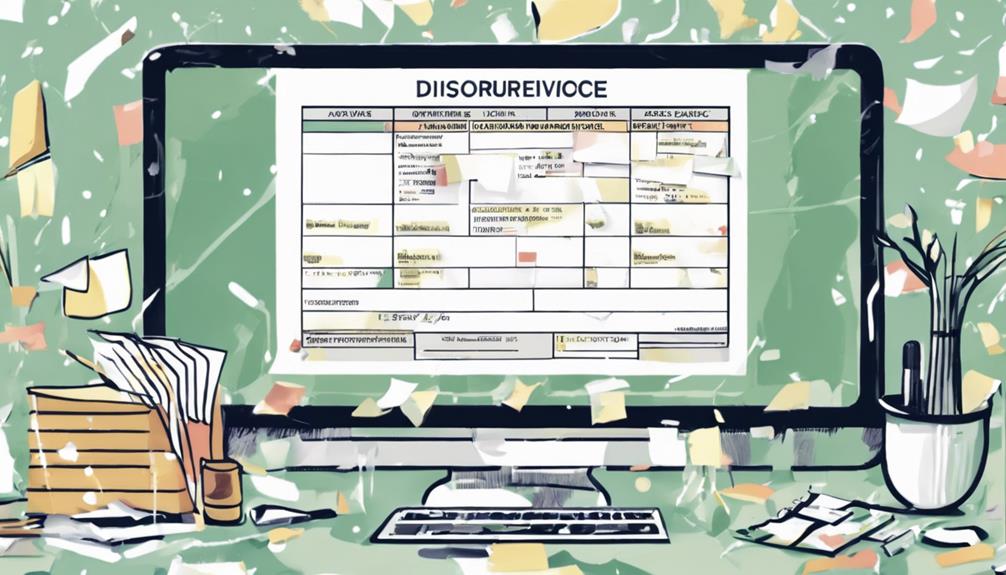In Arkansas, divorce mediation entails examining fault and no-fault divorce choices, talking about equitable property distribution, determining child custody agreements, recognizing the advantages of mediation over litigation, distinguishing between contested and uncontested divorce procedures, and acknowledging the crucial role of the mediator in achieving agreeable resolutions. Understanding these elements can streamline the divorce process and facilitate more seamless outcomes.
Key Takeaways
- Arkansas divorce mediation prioritizes children's best interests.
- Mediators facilitate discussions on custody, support, and property.
- It offers a faster, cost-effective alternative to court proceedings.
- Mediation promotes control, reduced stress, and positive resolutions.
- Impartial mediators ensure fair agreements, guiding couples through the process.
Fault Vs. No-Fault Divorce in Arkansas
In Arkansas, understanding the distinction between fault and no-fault divorce is important when managing the legal process of marital dissolution. Fault divorce in Arkansas involves proving grounds such as cruel treatment, adultery, habitual drunkenness, or imprisonment. On the other hand, no-fault divorce in Arkansas requires spouses to live separately for 18 months with no hope of reconciliation.
The grounds for fault divorce can impact property division and custody decisions based on what's proven in court. It's essential to comprehend that fault divorce necessitates proving wrongdoing, while no-fault divorce is based solely on the separation period. Knowing these differences is crucial for handling the divorce process effectively in Arkansas, especially when considering property division and custody decisions.
Property Division Considerations in Mediation

When engaging in divorce mediation, couples navigate property division considerations through an equitable distribution of assets and debts acquired during the marriage. In Arkansas, this process involves weighing factors such as each spouse's contribution to the household, economic circumstances, and future needs.
The state follows equitable distribution laws, aiming for a fair, though not always equal, division of property. Through negotiation, couples can decide on property division terms themselves in mediation, tailoring agreements to their unique situation. This approach allows for a more personalized and flexible way to handle property division, promoting solutions that both parties can agree on.
Child Custody Mediation Process Explained
Facilitating discussions between parents, child custody mediation in Arkansas aims to prioritize the best interests of the child. Through this mediation process, parents work with a neutral mediator to reach agreements on child custody and visitation arrangements.
The goal is to create a parenting plan that outlines custody schedules, visitation arrangements, and decision-making responsibilities with a focus on the child's well-being. By promoting cooperation and reducing conflict, child custody mediation lays the groundwork for effective co-parenting post-divorce. It provides a structured framework for parents to navigate the complexities of sharing parental duties and making decisions in the child's best interests.
Importantly, any agreements reached during child custody mediation aren't only legally binding but also enforceable in court, offering a secure foundation for co-parents to move forward with clarity and certainty.
Through this process, parents can work together to create a supportive and stable environment for their children despite the challenges of divorce.
Benefits of Choosing Mediation Over Litigation

Shifting from the focus on child custody mediation in Arkansas, moving to the benefits of choosing mediation over litigation emphasizes the advantages of a more collaborative approach in resolving divorce disputes. Opting for mediation can lead to quicker settlements, often achieved in just a few sessions, making it a more efficient process.
Additionally, mediation tends to be less expensive compared to traditional court proceedings, offering a more cost-effective solution for divorcing couples. One of the key benefits of mediation is that couples have more control over the outcome and can actively participate in creating their own settlement agreements, providing a sense of empowerment and ownership over the decisions made.
Moreover, the mediation process is known to be less stressful and more amicable, fostering positive discussions and helping to preserve relationships even after the divorce is finalized. Choosing mediation over litigation can result in a smoother, more collaborative divorce experience, addressing the needs of both parties in a more constructive manner.
Understanding Contested Vs. Uncontested Divorce
When going through a divorce, it's important to understand the difference between contested and uncontested divorce.
In uncontested divorce, both parties agree on the terms, making the process faster and less stressful.
On the other hand, contested divorce involves disagreements that may lead to a longer and more costly legal battle.
Types of Divorce
In understanding the types of divorce, it's essential to differentiate between contested and uncontested divorce proceedings.
Uncontested divorce occurs when both spouses agree on all aspects, like child custody and property division, making the process quicker and less costly. It's a more harmonious option suited for parties who can communicate effectively.
On the other hand, contested divorce involves disagreements on critical issues, often leading to court proceedings and possibly a trial. In such cases, court intervention may be necessary to settle disputes and make decisions.
Uncontested divorces typically involve mediation sessions, while contested divorces can escalate to formal legal battles.
Choosing the right type of divorce depends on the level of cooperation between the parties and the complexity of the issues involved.
Legal Implications and Process
Exploring the legal implications and process of divorce, understanding the distinctions between contested and uncontested proceedings is essential.
In Arkansas, contested divorce involves unresolved issues that lead to court intervention, often resulting in longer, more expensive legal proceedings. Proof of fault is required in contested divorces to establish grounds for the marriage dissolution.
On the other hand, uncontested divorces occur when spouses agree on all aspects, leading to faster, less costly proceedings with lower stress levels. Mediation allows couples to reach an agreement outside of court, giving them control over the outcome.
The advantages of mediation are evident in specific circumstances, offering a more amicable and efficient way to resolve disputes.
Settlement Agreements
Moving from the legal implications and process of divorce, understanding settlement agreements is essential in distinguishing between contested and uncontested divorce proceedings in Arkansas.
In uncontested divorces, spouses reach agreements on various issues like child custody and visitation, leading to a smoother and less adversarial process.
On the other hand, contested divorces involve disagreements that may require court intervention, potentially leading to trials where a judge makes decisions on unresolved matters.
Mediation plays an important role in helping couples negotiate and come to mutually acceptable terms through settlement agreements. These agreements outline the terms of the divorce, including child custody arrangements and other important decisions, ultimately guiding the divorce process towards a resolution that's agreeable to both parties.
Role of a Mediator in Divorce Proceedings

Mediators play an essential role in divorce proceedings by facilitating communication and negotiation between spouses. They help guide discussions on key issues like child custody and property division towards fair resolutions.
Maintaining neutrality, they focus on assisting parties in reaching mutually beneficial agreements that are legally binding.
Mediators Neutral Stance
Maintaining a neutral stance in divorce proceedings, a mediator's primary role is to facilitate fair and unbiased discussions between parties. Mediators don't provide legal advice or take sides but focus on guiding the negotiation process towards solutions that work for both parties.
In cases involving custody, privacy, and family law matters, the mediator guarantees that both individuals have equal opportunities to express their concerns and preferences. By upholding a neutral position, the mediator helps create a safe space for constructive dialogue, fostering an environment where mutual agreements can be reached.
Their commitment to impartiality is essential in assisting couples through the complexities of divorce while promoting fairness and understanding.
Facilitating Communication Between Spouses
In divorce proceedings, the mediator plays a pivotal role in fostering effective communication between spouses to facilitate negotiation and decision-making on key issues. The mediator acts as a neutral third party, guiding discussions on important matters such as child custody, spousal support, and property division. They help parties reach mutually acceptable solutions that are legally binding, without providing legal advice. By creating a respectful and cooperative environment, the mediator assists spouses in managing emotions, making informed decisions, and focusing on the best interests of all involved. Here is a table illustrating the mediator's role in divorce proceedings:
| Mediator's Role | Facilitating Communication and Negotiation |
|---|---|
| Key Issues Discussed | Child Custody, Spousal Support, Property Division |
| Neutral Third Party | Guides Discussions without Providing Legal Advice |
| Creating Respectful Environment | Helps Parties Reach Mutually Acceptable Solutions |
| Focus on Best Interests of All | Facilitates Decision-Making for Legally Binding Agreements |
Frequently Asked Questions
What Not to Say in Divorce Mediation?
In divorce mediation, we avoid making threats, using hurtful language, withholding information, misrepresenting facts, discussing irrelevant issues, or being overly aggressive. These actions hinder progress and can lead to unproductive discussions.
How Does Mediation Work in Arkansas?
Mediation in Arkansas involves a neutral mediator guiding discussions between divorcing spouses on custody, property, and support. We collaborate to find solutions. Agreements are binding and carry legal weight. If no resolution, court may finalize.
How Long Does It Take to Finalize a Divorce in Arkansas?
Finalizing a divorce in Arkansas can vary based on complexity. Uncontested divorces, where terms are agreed upon, typically take 30 to 60 days. However, contested divorces, with disputes, can extend due to court proceedings.
How Does Divorce Court Work in Arkansas?
Divorce court in Arkansas operates through specific laws and procedures. Judges decide based on evidence and state laws. Parties may need to attend court hearings. The process aims for fair outcomes for all involved.
Can Objections in Court Affect the Outcome of Arkansas Divorce Mediation?
Understanding objections in court is crucial in Arkansas divorce mediation. The objections raised during the proceedings can greatly impact the final outcome. It is important to be aware of the potential influence objections can have on the mediation process and to be prepared to address them effectively.
Conclusion
To sum up, Arkansas divorce mediation offers a more efficient and cost-effective way to resolve disputes compared to traditional litigation.
Did you know that over 80% of couples who choose mediation find it to be a successful and satisfactory process?
This statistic highlights the effectiveness of mediation as a method for achieving mutually beneficial outcomes in divorce proceedings.
Consider mediation as a viable option for your divorce to save time, money, and emotional stress.











